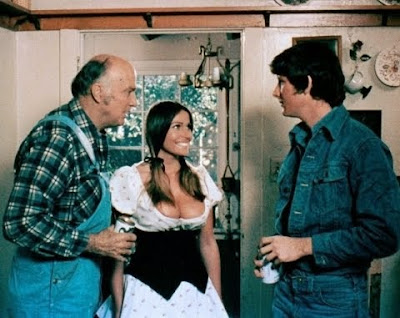Paris Blues
We all have this innate desire to love and be loved, right? For much of the human race, finding a mate is a priority that will dictate life decisions, perhaps at the cost of fully exploring their talents and interests. It's possible that more than a few geniuses forewent a chance at greatness via their gifts to settle down with a significant other and maybe produce some offspring. And some of those may well be forever nagged by what could've been, ultimately deciding if they made the right decision.
Whether someone chooses to devote full attention to their vocation/hobby or courtship can make for some workable drama. Occasionally, great drama. 1961's PARIS BLUES, however, leans more toward the former and features two American expatriates who have a gift for music - jazz, a free form very popular in Paris in the middle twentieth century. Ram Bowen (Paul Newman) and Eddie Cook (Sidney Poitier) play in an ensemble at Club 33 to the near orgasmic delight of fans (note the hilarious opening credits). Ram has aspirations of writing and has been working on a piece that he hopes will be published and played by trumpeter Wild Man Moore (played by the great Louis Armstrong). He worries that its melody is "too heavy".
The men similarly enjoy their free form lifestyles, with no strings attached lovers and crazy work hours. No one to nag them when they come home at dawn. But when attractive American tourists Lillian (Joanne Woodward, the real life Mrs. Newman) and Connie (Diahann Carroll) steal their hearts, what will become of their careers? Their freedom? For a hopelessly smitten Eddie, there are valid concerns of a life back in the States, a place filled with the racism he had escaped five years before. Who could blame him for retreating to a place where he can live and work without fear of exclusion (not to mention physical harm) due to his skin color? But did he run from his responsibilities, as Connie repeatedly chides? Responsibilities to take up a fight to make his homeland a place of equality?
Ram is less quick to give up his charmed existence, less obvious in his moody demeanor to admit he has fallen in love. Lillian proves to be a solid match - a worldly, strong figure, someone who's been around far more than her friendly and loving manner would suggest. Not shy either, as she's someone who will, you know, on the first date. She's also a divorcee with two children back home. Will Ram trade his carefree ways for a life of stability? Will he be willing to leave the creative atmosphere of Paris, one that would be more nuturing of his gifts than the certain sterility of domestic life? Of a place where little ragamuffins will constantly interrupt his composing?
PARIS BLUES was a disappointment for me, a routine film with progressive ideas. I applaud director Martin Ritt's film for its willingness to suggest that in its earlier scenes that Ram, a white man, might entertain a relationship with Connie, a black woman. And that a gay couple is seen in the jazz club. And the frankness with which a drug subplot is handled. The central dilemmas of love vs. career are nothing new, but the discussions between the couples (especially Eddie and Connie) are generally intelligent and realistic. But I did cringe at a few of Lillian's lines.
Ram: (Speaking on the taking of chances): You get kicked in the teeth that way.
Lillian: My brother's a dentist.
Or this one, a bit too contrived, too written. Like something out of an inferior Neil Simon script:
Ram: You just picked the wrong guy for what you wanted.
Lillian: Yeah?
Ram: Yeah. I'm not on the market.
Lillian: I wasn't shopping.
Perhaps there were too many screenwriters (five are credited). It may explain why the film feels so stop/start, with a lack of flow. Ritt (HUD, THE SPY WHO CAME IN FROM THE COLD, NORMA RAE) supplies ample atmosphere in the City of Light's many outdoor vistas and cramped apartments and backstages. The music is great, naturally, with the "Battle Royal" sequence a classic for jazz aficienados. Armstrong is luminous no matter what's he's doing in this picture, acting or blowing sweet sounds. Those seeking the sounds alone will be satisfied, I think.
But our timeless storyline occupies the most screen time, How successful it is will depend largely on your age, how many movies/T.V. shows you've seen, and if you've ever made big compromises in the name of love, or something else.



Comments